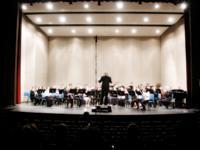
In even the smallest towns in the U.S., there are always live music venues to be found. Whether it be the town pub, the performing arts center, the university concert series, the cozy restaurant or coffee house, the community center, or the church fellowship hall, one can always find some form of live music in their hometown. I’ve found that we, as musicians, are usually the first to neglect these opportunities to contribute to a thriving music scene right outside our front door. Admittedly, this article runs the risk of sounding like a rant. But, I’m very passionate about this ‘rant’.
I live in a university town in Illinois. I’m constantly amazed at how large the music community in this town actually is. I’ve lived here for nearly 5 years, and I still get the chance to play with new musicians on a regular basis. And, I should mention that the music being made in this town (by “educated†musicians and otherwise) is at an extremely high level, and very diverse. Furthermore, each time I attend a high-profile concert at the local performing arts center, the place is nearly always packed full.
In contrast, I’m continually discouraged by the fact that live music venues in this area, such as bars, taverns, pubs and restaurants, are struggling to stay afloat in this tough economic time. I know for a fact that there are, quite literally, thousands of musicians in this town. Also, there are perhaps tens of thousands of people (non-musicians) who are very passionate about the arts…particularly music. Yet still, out of all of these people, I perform regularly to audiences of 10 people (sometimes less). This scenario plays out in many communities across this country…and as a musician myself, I find it to be tragic.
Chances are, if you are reading articles on this website, you have dedicated your life to music performance and/or education. Or, perhaps, you are an aspiring musician or educator who hopes to make this your future profession. So, consider this: some of the greatest musicians in any genre of music were members of a thriving music community.
Claude Debussy, for example, frequented informal meetings with impressionist artists in Paris around the turn of the twentieth century. Through intense dialogue and an exchange of ideas with these artists, Debussy was inspired to break free from traditional tonal functions and harmonies, and thus transformed “classical“ music. This is why he receives so much attention in music theory and history texts today.
Also, Miles Davis was a mainstay at informal meetings and rehearsals in the basement of arranger and composer Gil Evans in New York City during the mid-to-late 1940’s. The result of these exchanges was Miles Davis’s legendary album Birth of the Cool…which in turn led to an entirely new genre of jazz music which is now called West Coast Jazz.
These are only two examples out of many. I believe that we, as musicians and educators, have a responsibility to support the growth of these potential hotbeds of creativity right outside our front doors. It is also up to us to spread this philosophy to our students, colleagues, and peers. For those of us who wish to make music our profession, the most detrimental thing we can do is to let these opportunities fall by the wayside.
Why?… because if attendance at live music venues continues to spiral downward, club owners will stop hiring musicians, buy a jukebox and/or ipod, and chances for musicians to perform will dwindle, if not disappear. There is a limited amount that can be learned in a classroom or on the internet. I’m an ardent supporter of these things too…but they have their limitations. The feeling, spirit, and learning experience of real human beings making live music does not live in any iPod on this planet. Nor does it live on the internet. Nor does it live on T.V. or radio stations. It lives in the venues all across the country that support live, local music, many of which will shut their doors if we don’t take advantage of the opportunity to support them.
